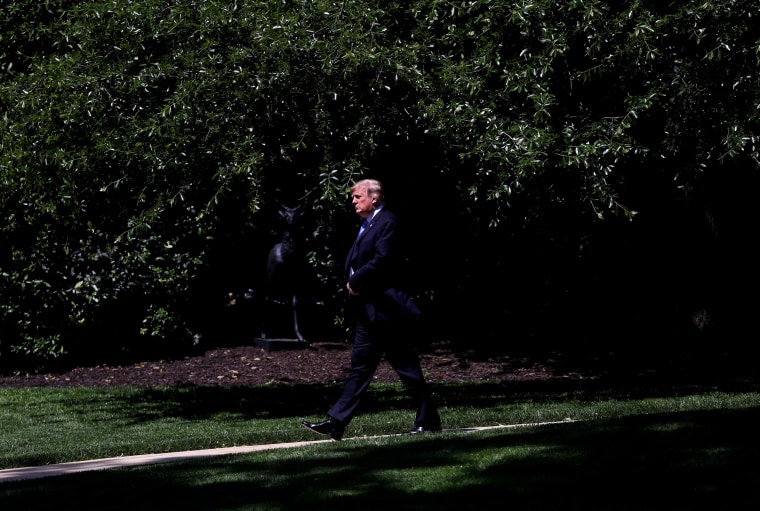The White House told the House Judiciary Committee in a letter Wednesday that it will not comply with a broad range of the panel's requests and called on it to "discontinue" its inquiry into President Donald Trump.
"Congressional investigations are intended to obtain information to aid in evaluating potential legislation, not to harass political opponents or to pursue an unauthorized 'do-over' of exhaustive law enforcement investigations conducted by the Department of Justice," White House counsel Pat Cipollone wrote, citing special counsel Robert Mueller's 448-page report on his probe into Russian interference in the 2016 presidential election and whether Trump sought to obstruct the investigation.
Cipollone wrote, however, that he was not exerting executive privilege, adding that he would consider more narrow requests from the committee if it can provide the legal support and legislative purpose for such requests.
"The appropriate course is for the Committee to discontinue the inquiry," Cipollone wrote to the panel's chairman, Jerrold Nadler, D-N.Y. "Unfortunately, it appears that you have already decided to press ahead with a duplicative investigation, including by issuing subpoenas, to replow the same ground the Special Counsel has already covered."
In early March, Nadler requested information from 81 individuals or entities connected to the president as part of a broad investigation into whether Trump abused his power or acted corruptly. Cipollone wrote his letter in response to Nadler's March letter requesting documents from the White House as part of that broad push.
Responding to the White House on Wednesday, Nadler told reporters that the claims in the letter were "outrageous," "ridiculous," "preposterous," and "un-American," and vowed that his panel would continue its investigations.
"Taking that position that a president cannot be indicted, they are saying only Congress can hold a president accountable, and now they're saying that Congress can’t, which means nobody can, which means the president is above the law," Nadler said. "And that is an un-American, frankly un-American claim."
“I don't know whether they're trying to taunt us towards an impeachment or anything else," Nadler added. "All I know is that they have made a preposterous claim."
Cipollone homed in on a rationale that the White House and Trump's business have made elsewhere: that Congress cannot conduct such oversight of the president unless it has a specific legislative purpose.
In his letter, Cipollone wrote that "it appears that the committee's inquiry is designed not to further a legitimate legislative purpose, but rather to conduct a pseudo law enforcement investigation on matters that were already the subject of the Special Counsel's long-running investigation and are outside the constitutional authority of the legislative branch."
"The only purpose for this duplication seems to be harassing and seeking to embarrass political opponents after an exhaustive two-year investigation by the Department of Justice did not reach the conclusion that some members of the Committee apparently would have preferred," he continued. "That, of course, is not a permissible purpose for demanding confidential information from the Executive."
Congress has broad oversight powers that have been affirmed by the Supreme Court. In McGrain v. Daugherty, the court ruled the "potential" for legislation to come about as a result of a congressional inquiry was sufficient rationale to launch one. And in Eastland v. United States Servicemen’s Fund, the court ruled, "To be a valid legislative inquiry there need be no predictable end result."
According to the Congressional Research Service, Congress generally enjoys "extremely broad" power "to obtain information, including classified and/or confidential information."
"While there is no express provision of the Constitution or specific statute authorizing the conduct of congressional oversight or investigations, the Supreme Court has firmly established that such power is essential to the legislative function as to be implied from the general vesting of legislative powers in Congress," CRS wrote.
Despite that broad interpretation of legislative purpose, "its scope is not without limits," the agency added. "Courts have held that a committee lacks legislative purpose if it appears to be conducting a legislative trial rather than an investigation to assist in performing its legislative function."
And although "'there is no congressional power to expose for the sake of exposure,' 'so long as Congress acts in pursuance of its constitutional power, the Judiciary lacks authority to intervene on the basis of the motives which spurred the exercise of that power,'" CRS said.
A federal judge expressed skepticism at a hearing Tuesday about Trump's efforts to block Congress from getting some of his financial records.
Amit Mehta, a U.S. District Court judge in Washington, told Trump lawyer William Consovoy that he would have trouble ruling that Congress did not have the constitutional authority to obtain Trump's taxes due to a lack of explicit legislative purpose because of prior Supreme Court rulings.
In a conference call with reporters Wednesday after Cipollone sent his letter, a senior administration official said Nadler should "rethink this oversight or investigation," accusing him of "brushing aside the conclusions of the Department of Justice, and doing so in favor of political theater."
Democrats argued that Mueller's report made clear that it was up to Congress to further any inquiry into whether the president obstructed justice; Mueller wrote in his report that he neither concluded Trump had committed a crime nor exonerated him of having done so.
The senior administration official said Nadler "has to do a better job of setting out a legitimate legislative purpose for what" he's doing," and called on him to make clear "some type of public law he intends to introduce" alongside his committee's investigation.
When asked, the official said Trump was not "above the law."
"But he also is not below the law," the official said. "He has rights and privileges as the rest of us do."
And as president, the official said, Trump "has a couple more rights that the rest of us don't have."

